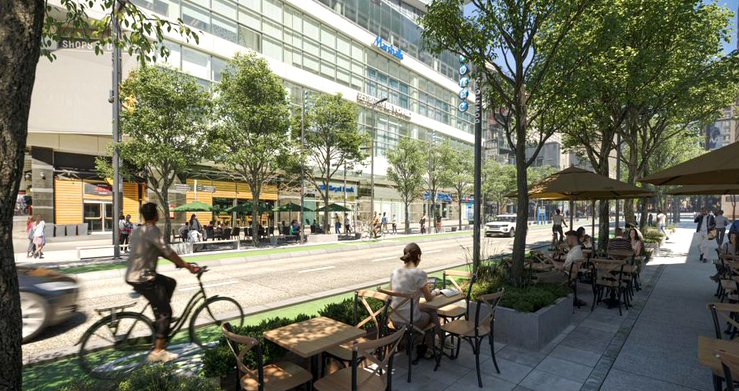• Flip Book • eNews • eAdventures • eCities • eBikeTypes • eRoad • eMTB • eUrban • eCargo • eBikeTests •
Cycling Cities on the Move – Toronto, Ontario
October 29, 2021 - Population 2,731,571 – Toronto, the capital of Ontario and Canada’s largest city, has made rapid gains in its cycling agenda. In 2020, the City implemented almost 40km of new on-street cycling infrastructure, Toronto’s greatest one-year increase in temporary and permanent bike lanes.

The result was a 40% increase in ridership and polls indicating that 85% of Torontonians supported protected bike lanes. The City’s ActiveTO program, which saw major weekend road closures, was equally successful.
Then, in early Feb. 2021, a historic City Council vote of 21–5 confirmed YongeTOmorrow, officially ratifying an ambitious plan 10 years in the making, to restrict vehicular traffic along parts of iconic Yonge St. to establish more room for pedestrians, cyclists, events and greenspace.

Toronto’s 10-year Cycling Network Plan (CNP), initially approved in 2016, was re-approved in 2019 providing a new timeframe to improve road work coordination, accountability, and implementation. The comprehensive roadmap calls for 170km of bike lanes across the city.
The success of the Bloor-Danforth bike lanes, along with the Yonge St. announcement, are feathers in the cap of advocacy groups like Cycle Toronto who have lobbied the City for years. Their new Move 365 Connect campaign focuses on eight sectors in Toronto to build safe and sustainable cycling networks as safety remains a paramount concern for vulnerable users.

With 187,000 members, Bike Share Toronto is thriving with ridership up 20% in part due to the pandemic. In 2020, it celebrated its 10th anniversary, adding 1,850 bikes along with 300 e-bikes and 10 e-bike charging stations as part of a pilot program. With a total of 6,850 bikes and 625 stations, it’s the third-largest bikeshare program in North America, recording 2.9 million trips in 2020 a new record since its inception.
Toronto is also one of the first municipalities in Ontario to approve bylaw amendments for the expanded use of e-cargo bikes. In June 2021, City Council approved a plan to update its bylaws to allow for the continued use of e-cargo bikes to support unprecedented demand for local deliveries, while making way for a new micro-mobility pilot for larger e-cargo bikes.







